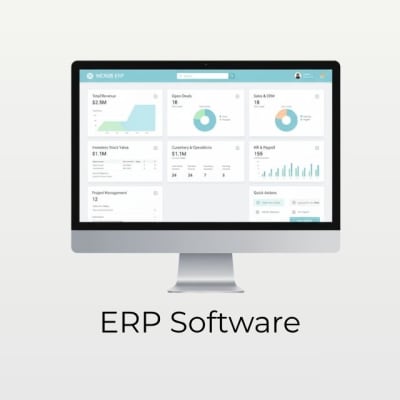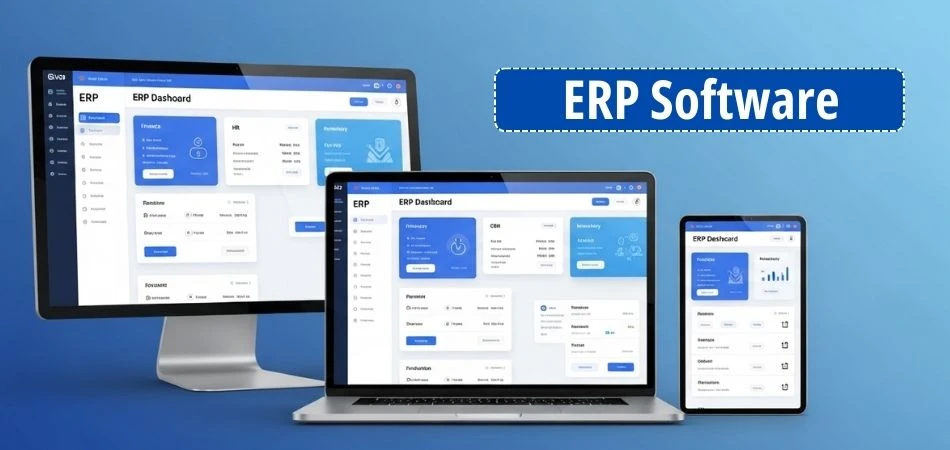

Available from 1 sellers

ERP (Enterprise Resource Planning) software in Bangladesh is becoming essential for businesses that want to integrate and streamline their operations. Instead of managing sales, inventory, finance, HR, and supply chain separately, ERP software combines everything into one powerful system. This gives businesses real-time visibility, better efficiency, and stronger decision-making ability.
From small enterprises to large corporations, ERP solutions simplify complex processes, reduce manual work, and improve collaboration between teams. With cloud-based access, data security, and automation, ERP software is the smart choice for companies looking to grow faster while maintaining complete control over their resources and operations.
| Feature | Availability |
|---|---|
| Financial Management | Yes |
| Inventory & Supply Chain | Yes |
| Sales & CRM | Yes |
| Human Resource Management (HRM) | Yes |
| Manufacturing & Production | Yes |
| Project Management | Yes |
| Reporting & Analytics | Yes |
| Cloud Integration | Yes |
| Data Security | Yes |
Description
ERP (Enterprise Resource Planning) software is a powerful business management solution that integrates multiple departments into one centralized system. Instead of working with separate tools for finance, HR, inventory, sales, or production, ERP connects them all making data flow seamlessly across the organization.
In Bangladesh, where businesses are growing rapidly in manufacturing, retail, distribution, and services, ERP software is no longer a luxury, it's a necessity. It helps companies streamline processes, reduce manual errors, and make smarter, data-driven decisions. By offering real-time visibility into every department, ERP empowers business leaders to save costs, improve productivity, and scale operations efficiently.
Enterprise Resource Planning (ERP) software is not just a tool, it's a complete digital ecosystem that revolutionizes the way businesses manage their operations. From finance to human resources, from supply chain to customer engagement, ERP integrates every aspect of your company into one unified platform. Below are the most powerful and business-transforming features of modern ERP software:
One of the core strengths of ERP is its centralized dashboard. Instead of juggling multiple applications, business owners and managers can access finance, HR, sales, supply chain, inventory, and more in one place. This provides real-time visibility, faster decision-making, and improved collaboration across departments.
ERP comes with advanced accounting and finance tools to simplify daily operations. Businesses can manage budgets, expenses, invoicing, payroll, taxes, audits, and compliance in a single system. Automation reduces human errors and ensures smooth financial reporting while staying aligned with local and international regulations.
Managing inventory and supply chains becomes effortless with ERP. Companies can track stock levels, monitor warehouse operations, manage suppliers, and optimize logistics in real time. Automated alerts for low stock and order management reduce costs while improving supply chain efficiency and customer satisfaction.
ERP software includes a complete Human Resource Management System (HRMS). From employee recruitment and onboarding to attendance tracking, performance evaluation, and payroll processing, everything is automated. This saves time, boosts employee satisfaction, and ensures accurate salary distribution and HR compliance.
Strong customer relationships are at the heart of any business. ERP’s integrated CRM tools help businesses track leads, manage customer interactions, monitor sales pipelines, and handle after-sales support. By analyzing customer data, businesses can build long-term relationships and increase sales conversions.
For manufacturing industries, ERP provides complete control over production cycles, raw material planning, quality control, and delivery schedules. It reduces delays, optimizes resources, and ensures on-time production. Businesses can align demand with supply, improving both productivity and profitability.
ERP enables businesses to manage multiple projects simultaneously. With task assignment, milestone tracking, resource allocation, and cost control, organizations can ensure projects are completed on time and within budget. This feature is crucial for industries where precision and accountability are key.
Modern ERP systems come with built-in reporting and business intelligence tools. These provide AI-driven analytics, customizable dashboards, KPIs, and predictive forecasting. With actionable insights, businesses can make data-driven decisions, identify opportunities, and minimize risks.
In today’s digital world, businesses need flexibility and mobility. ERP software offers cloud-based access, allowing owners and employees to work securely from anywhere. This ensures business continuity, remote collaboration, and real-time updates, no matter where your team is located.
Protecting sensitive business data is critical. ERP systems include advanced security protocols, encryption, role-based access controls, and automated data backups. This reduces the risk of cyber threats, data loss, and unauthorized access, giving businesses complete peace of mind.
Implementing ERP (Enterprise Resource Planning) software is more than just a technology upgrade; it's a complete transformation of how businesses operate. For companies in Bangladesh, ERP brings efficiency, transparency, and growth opportunities across every department. Here are the major benefits:
ERP provides a 360-degree view of your organization. From finance and HR to sales, inventory, and supply chain, everything is connected in one platform. This allows owners and managers to make smarter decisions with full visibility.
By automating repetitive tasks such as payroll, invoicing, data entry, and stock management, ERP reduces human errors and saves valuable time. Teams can focus on strategic work instead of manual operations.
ERP minimizes operational costs by optimizing stock handling, reducing wastage, cutting down manpower inefficiencies, and improving workflow speed. Businesses in Bangladesh can achieve higher profitability without increasing expenses.
With live dashboards and instant reports, business leaders no longer rely on outdated data. Real-time insights help in quick decision-making, risk management, and opportunity identification.
Departments can work seamlessly as ERP ensures all teams share updated, synchronized data. This eliminates duplication, miscommunication, and confusion boosting overall teamwork and productivity.
ERP software grows alongside your business. As you expand, you can add new modules like advanced CRM, eCommerce integration, or manufacturing without replacing the system making it future-ready.
Integrated CRM tools help businesses respond faster, track customer history, and deliver personalized services. This leads to higher customer satisfaction, loyalty, and repeat sales.
ERP ensures businesses in Bangladesh remain aligned with VAT, tax laws, payroll policies, and HR regulations. Automated compliance reduces risks and penalties.
With faster operations, stronger insights, and smarter decision-making, ERP gives your business a clear competitive edge in the market. Companies that implement ERP can scale faster and serve customers better.
ERP acts as the digital backbone of modern businesses. Instead of separate tools and disconnected workflows, it connects everything into one ecosystem. Here’s how it works step by step:
All key departments finance, HR, sales, inventory, supply chain, and customer service are connected under one unified platform.
Every business activity whether it’s a purchase order, sales invoice, payroll entry, or stock movement is stored in a single shared database. Updates in one department instantly reflect across all others.
Daily operations like attendance tracking, invoicing, salary processing, and inventory monitoring run automatically, saving time and reducing manual errors.
ERP introduces structured workflows that ensure consistency, transparency, and accountability in every department.
Business leaders can view live performance dashboards, detailed reports, and financial summaries to monitor operations anytime.
With secure cloud hosting and mobile access, teams can work remotely, manage tasks, and approve processes from anywhere in the world.
ERP turns raw data into actionable insights through AI-powered analytics. Companies can predict demand, optimize supply chains, and plan smarter business strategies.
Q1: What makes ERP different from accounting software?
Accounting software mainly handles finance, but ERP covers the entire organization finance, HR, sales, supply chain, and more.
Q2: Is ERP suitable for SMEs in Bangladesh?
Yes. Modern ERP systems are scalable and affordable for small and medium businesses.
Q3: How long does ERP implementation take?
It depends on company size and complexity, usually from a few weeks to several months.
Q4: Can ERP support local compliance in Bangladesh?
Absolutely. ERP can be customized for VAT, tax, and payroll compliance in Bangladesh.
Q5: Is ERP secure for storing sensitive data?
Yes. Cloud ERP uses encryption, access control, and regular backups to ensure security.
Be the first to ask a question about this product!